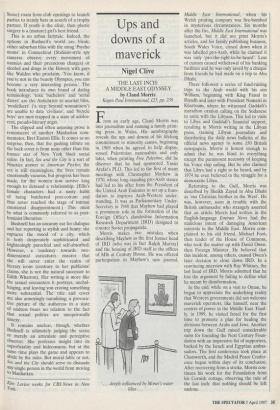Ups and downs of a maverick
Nigel Clive
THE LAST INCH: A MIDDLE EAST ODYSSEY by Claud Morris Kegan Paul International, £25, pp. 238 From an early age, Claud Morris was into journalism and running a family print- ing press in Wales. His autobiography reveals the ups and downs of his lifelong commitment to minority causes, beginning in 1969 when he agreed to help dispos- sessed Palestinian nationalists and only later, when printing Free Palestine, did he discover that he had sponsored Yassir Arafat's PLO. This led to the first of many meetings with Christopher Mayhew in 1970, whose long-standing pro-Arab stance had led to his offer from the President of the United Arab Emirates to set up a foun- dation to improve Arab-Western under- standing. It was as Parliamentary Under- Secretary in 1948 that Mayhew had played a prominent role in the formation of the Foreign Office's clandestine Information Research Department (IRD) designed to counter Soviet propaganda.
Morris makes two mistakes when describing Mayhew as the first former head of IRD (who was in fact Ralph Murray) and the housing of IRD staff in the offices of MI6 at Century House. He was offered participation in Mayhew's new journal, ' . . . deeply influenced by Monet's water lilies . . . ' Middle East International, when his Welsh printing company was fire-bombed in mysterious circumstances. Six months after the fire, Middle East International was launched, but it did not print Morris's articles, and his family publishing business, South Wales Voice, closed down when it was labelled pro-Arab, while he claimed it was only 'pro-the-right-to-be-heard'. Loss of custom caused withdrawal of his banking facilities and he was only saved by a cheque from friends he had made on a trip to Abu Dhabi.
There followed a series of fund-raising trips to the Arab world with his son William, beginning with King Faisal in Riyadh and later with President Numeiri in Khartoum, where he witnessed Gaddafi's marathon oration calling on the Sudanese to unite with the Libyans. This led to visits to Libya and Gaddafi's financial support, resulting in Morris writing in the Libyan press, training Libyan journalists and distributing the daily news bulletin of the official news agency to some 150 British newspapers. Morris is honest enough to admit that he was blind to everything except the paramount necessity of keeping his Voice ship sailing. But he also claimed that Libya had a right to be heard, and by 1974 he even believed in the struggle for a democratic Libya.
Returning to the Gulf, Morris was described by Sheikh Zayed in Abu Dhabi as 'our Christian brother in the West'. He was, however, soon in trouble with the British ambassador who strangely asserted that an article Morris had written in the English-language Emirate News had the malicious intent of damaging American interests in the Middle East. Morris com- plained to his old friend, Michael Foot, then leader of the House of Commons, who took the matter up with David Owen, then Foreign Minister. He believed that this incident, among others, caused Owen's later decision to close down IRD. In a convincing interview with Ray Whitney, the last head of IRD, Morris admitted that he lost the argument by failing to define what he meant by disinformation.
In the end, while on a visit to Oman, he began to appreciate the underlying reality that Western governments did not welcome maverick operators, like himself, near the centres of power in the Middle East. Final- ly, in 1989, he visited Israel for the first time to promote a plan for healing the divisions between Arabs and Jews. Another trip down the Gulf raised considerable sums for founding the Next Century Foun- dation with an impressive list of supporters, backed by the Israeli and Egyptian ambas- sadors. The first conference took place at Chatsworth, and the Madrid Peace Confer- ence began within days of its conclusion. After recovering from a stroke, Morris con- tinues his work for the Foundation from his Cornish cottage, observing the rule of the last inch: that nothing should be left undone.


























































 Previous page
Previous page